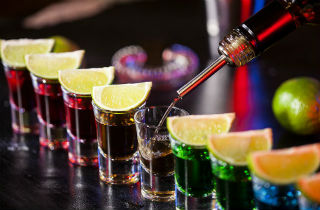Is my drinking a problem?
Q: I’ve encountered a reoccurring pattern that seems to provide a challenge for me. Often times when I allow myself to imbibe, I’ll set a specific time that I don’t want to drink before, and of course a limit on the quantity that I allow myself. Almost always I drink before the time of day I prescribed, and I’ll consume more (sometimes way more) than the plan. Simply put……. “My PM actions rarely reflect my AM plans.” This can lead to several days of the same behavior before I finally reel myself in and gain some control back. So I’m trying to figure out exactly what makes it OK for me to break the deal I had with myself. Looking back, I don’t recall even thinking about the fact that opening that beer will lead to many more, not to mention the fact that I am breaking my word to myself. Any insights?
How much and how often do you drink?
A: Whether or not you have a drinking problem depends upon a few factors: how much, why, and when you drink. Experts recommend that you take a few steps to evaluate potential problem drinking. Not all people who drink every day, for example, have a drinking problem. During this process of evaluation, it helps to be truly honest with yourself.
1. Keep track of how much you drink – Track your drinking over a couple of weeks and compare it to healthy drinking standards. For men up to 65, this means drinking 4 or less drinks in a day and up to 14 drinks a week. For women, healthy drinking is 3 or less drinks in a day and up to 7 drinks a week. One standard drink is 12 ounces of regular beer, 8 to 9 ounces of malt liquor, 5 ounces of table wine, or 1.5 ounces of 80–proof spirits.
2. Set a drinking goal – Choose how much you will drink, if at all. For women a healthy goal is to drink one or less drinks per day. For men, no more than two drinks per day is a good goal. Write your drinking goal on a piece of paper and place it somewhere you will see it often.
3. Practice complementary drinking behaviors – Eat food before drinking and pace youself to one drink per hour. Also, avoid places or people that make you drink when you don’t want to. Be prepared to say, “No, thanks” when someone offers you a drink that you don’t want. And choose other activities when you feel the urge to drink:
-
- allow the urge to pass with time
- distract yourself with something else
- remind yourself why you want to cut back on drinking
- talk with someone you trust
4. Know when you need help – Sometimes, monitoring your drinking and efforts to cut back don’t work. In these cases, you might have a drinking problem. But that’s not the end of the story. There is help for drinking problems – even beyond A.A. and the 12 step alcoholism treatment model.
Signs of a drinking problem
- Being late for work because of drinking
- Drinking after telling yourself you won’t
- Drinking alone when you feel angry or sad
- Drinking causes trouble in your relationships, in school, in social activities, or in how you think and feel
- Forgetting what you did while you were drinking
- Getting headaches or having a hangover after drinking
- Your drinking habits worry your family
When to get help for problem drinking
If you experience any one of these signs, seek help from an expert in alcohol consumption. Your family doctor might help you decide whether you should cut down or abstain completely from drinking. Or you can call a national alcohol help hotline to talk with someone anonymously about your situation. You can also seek help from a certified counselor/psychotherapist and address drinking issues using cognitive-behavioral therapy, mindfulness approaches, or non 12 step support.
There’s no shortage of resources for drinking problems. And no reason to be ashamed. There is help to stop and stay stopped. Please let us know how we can help by posting your questions or comments here.









Related Posts